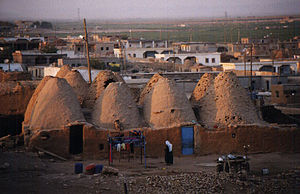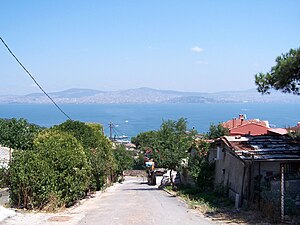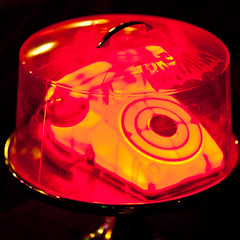I’ve been getting sick a lot lately, and every time, it seems to turn into a nasty throat infection where my tonsils swell up. I’ve had mono and strep and have been taking antibiotics every 2-3 months for my entire adult life, and enough already. I saw a doctor about it while I was living in upstate NY, but they were reticent to do anything about it, because of the cost and because adults recover slowly and painfully from tonsillectomies. But after getting sick in Antalya last month, I got a full exam, including having my sinuses inspected with a camera (which involved first having them anesthetized with a medicated foot-long Q-tip being jammed up them till I cried). The doctor was wonderful, explaining how my slightly-deviated septum on the left led to leakage causing innumerable ear infections on the right, and all the calcium there, and how the sinuses were OK to live with but my golf-ball sized trashcan tonsils really should come out as soon as I’m healthy.
Two weeks ago I went back to Elif’s mother’s best friend Mebruke, who owns a hospital, and her specialist held much admiration for my gargantuan puss-ridden tonsils, but he said they were now dangerously big, and he noticed that all the antibiotics I’d been on still had not eradicated the infection there. He put me on a regimen of more antibiotics and decongestants and antihistamines for a week and I was so knocked out from all these downers that I was looking forward to the operation, no matter how painful it would be. I decided to have it done at Mebruke’s hospital, which had modern equipment; Mebruke would even supervise the operation and people the night staff with doctors, not nurses, and would make the whole thing for next to nothing.
Last Monday was the tomography appointment next door to the hospital, which I was then to bring to my specialist (named Kemal) to see what else needed to be done with my face. Unfortunately, the tomography place had that Turkish relaxed way of doing business, meaning that they don’t take appointments and if something goes wrong, well, Maalesef (“it’s a shame; sorry.). That day their machines broke, and since we had an appointment with Kemal an hour later, we were out of luck; Elif gave them quite an earful (“How hard would it be to take down phone numbers in case something happens, you lazy…”), which embarrassed the people behind the counter in the waiting room and pleased me greatly.
We found another tomography place a couple of kilometers further into Europe, somewhere near Tehran. Burkas aren’t legal in Turkey but no one prosecutes them, especially in religious areas. While I have respect for the traditions of head-covering, I had no love for the women at the medical office, covered head to toe in black sheets, who would like nothing better than to have their children’s brains scanned with precious technology developed by the Great Satanic West which they wanted to send down into the fires of hell. I got my tomography done, chin-down on a pad, not moving for about 3 minutes while my nose dripped all over their pad, making a quick prayer to Allah that the next patient to lie on my boogers would be wearing a burka.
We brought the film to Kemal, who found the same deviated septum the Antalya specialist found last month, and showed me all details of what needed to be cut and why I’d gotten ear infections and had to use nasal sprays and had sinus problems and allergies and headaches, and that I had cysts and had to have my sinuses and nostrils scraped out, and he said he’d cut my Johnny Wadd-sized small tongue down to size so I could actually swallow food instead of quietly coughing for a half hour after every meal, and how it would all be done while I was under the same anesthesia as for the tonsillectomy, which he scheduled for Wednesday. I told my mother Tuesday night, not wanting to have to tell her after the fact (like I did after I was stabbed in Philadelphia); the conversation was strained (“I wished you’d waited till you were back in the States, but it looks like you’ve made up your mind…but I understand it needed to be done and hope it will go without a hitch…but I wish you’d waited…”)
On Wednesday, I got to the hospital at 8AM; Mebruke personally came and ordered lots of extra bloodwork to test clotting and all sorts of other special precautions for the American “eniste” (“brother-in-law”). Dilek canceled her court appearance to come. I came in I signed a waiver, with the person filling out the form, as always, writing Sila for Sheila and giggling at Marvin. I got back another form saying, “You will be in pain after the operation, and what’s more, you will swallow blood, and since your stomach cannot digest blood, you will vomit the blood, and that’s perfectly normal; sincerely yours, M. Kemal Ataturk.” Elif said that when I come out, the first thing I should think about is to breathe through my mouth as there’d be tampons in my nostrils, and that she loved me, and at 10 AM, I was wheeled into the elevator, just like ten years ago but in very different circumstances, and it all felt like a Disney ride, really. I cracked jokes as I always do in hospitals and found the operating room suitably-equipped although annoyingly bright. They gave me the shot and the anesthesiologist asked me some questions in English, to test my consciousness; I answered in Turkish; he asked again in English to show off his knowledge of English to the other doctors; I asked in Turkish about how long would it take till I was out cold; and he said, anywhere from 30 seconds to 2 minutes; and I said, oh; and the next thing I know I’m lying in my private hospital room, in a whole lot of pain. I mean, in the country of Pain. Not in the capital city of Cancer, but probably somewhere near the suburbs of Kidney Stones, and fully subject to the region’s laws, schedules, and customs.
I missed some good stuff while I was out cold. The operation lasted 2 full hours; there were lots of problems that weren’t on the tomography, and they sewed up my uvula in a nice fancy ribbon with cow intestine which my body would absorb. Everyone was quite happy, and they revived me to tell me how happy they were and how well it went. I responded by punching and kicking everyone in sight, just to show them how grateful I was. They had to give me a tranquillizer to keep their own faces from having to be operated on. I’m told that I gave an extensive declamation which resulted in Mebruke, who’s very religious, asking, does “fuck” mean “kahretsin”? (“damn”) and Elif said no it means “sikter.” Mebruke said she’s glad she doesn’t speak English. Even with the tranquillizer, I just wanted to be in a fetal position, but that wasn’t about to happen, and when I wasn’t saying fuck, I apparently moaned it hurts over and over. I remember nothing from the first hour, not even the cartilage pieces they brought to show me per my request.
I had to stay the night; despite Ataturk’s message, I was barfing more than anyone wanted (especially me). I’d lay in agony, and then get a cold sweat, and sit up suddenly, which would make my blood pressure drop more than anyone felt happy about, and barf repeatedly and only a small hunk of throat and blood would come up, and then I’d sleep for another hour and repeat. I panicked during my third barfing, saying it was enough barfing already and that despite what Ataturk said I was not all right, but all the doctors-not-nurses checked my pulse and the machines and said it was all right, and they gave me some nice oxygen to make me believe the same, and Elif talked me through it and it was indeed all right, but Mebruke, who was supposed to then have her one day off in like a year, decided at 3AM to drive back to the hospital and supervise, and she analyzed the blood work and gave me a little blood thickener and I stopped barfing, and now that’s service you don’t see every day!
So Dilek and Mebruke and Elif sat up all night and Dilek worked on her court cases (she brought her typewriter and used the hospital as an office on Thursday) and they talked philosophy while I slept and moaned and barfed, and Mebruke talked about seeing people die and souls leaving their bodies, and Elif, my lovely hardline verificationist, would have none of it, and Mebruke’s husband showed up in the middle of the night to bring flowers for me and to fight with Mebruke about the state of their marriage and how fat Mebruke is and how they haven’t slept together in 15 years.
Friends and family and clients called all night – that is, friends and family and clients of Dilek. Cos cried because my parents hadn’t called, and most of all the doctors were looking very sad about my annemler, which means parents but translates as mothers (as if the Turks had acquired a strange understanding of the Jewish-family marital relation). Everybody asked Elif if my family was aware of the operation or if they were angry at me, and she couldn’t explain that one could never know, that it could be because I downplayed the operation to them to allay their worries. My parents were champs this time in the weeks up to us moving, and dealt with my accountant and bills – even though they’ve made it plain that they’re not thrilled with me being here or approve of my having surgery here. And everyone who’d been to America agreed how wonderful the Marvins are (they didn’t say annemler because Marvins sounded a whole lot cooler). But however much I downplay it, but there are irreconcilable cultural differences, from a country like Turkey where the hosts iron your underwear and let you sleep in the master bedroom, to America, where suffering and death are sometimes viewed as annoyances and you put your elders in old age homes (if they don’t put themselves there first) and you send Russell Stovers candies to their nurses so they won’t let your loved ones get bedsores. And even if Elif could say any of this, they would never understand it, because the doctors thought that just maybe the Land of the Marvins might have let 9/11 happen to their own people if it could give them cause to take even more charge of world affairs, and what a strange place their patient was from, the hospital owner’s friend’s daughter’s husband for whom they were staying up all night.
But Elif and I were more concerned with the pieces of throat that were coming up every hour, and what I really wanted was morphine which is the best thing of all. And Mehmet came to my room when I wanted to pee and brought the pee jug and I am never good at peeing in bed and I insisted on standing, so Mehmet held my right side and Elif held my left and Fatma held my wrist to check my blood pressure. And no, I did not need Mehmet hold my dick, no, I’m not forcing the pee out, just give me a minute, could you please look that way, I won’t fall, only one other person gets to hold my dick and that person is not named Mehmet.
And sometime on Thursday they let me out after walking me around and giving me an intermuscular injection in my right buttcheek, and I went home in a taxicab, and Sumru stayed with us for two more days mostly to get away from Bilgin, which meant I got to hear the dulcet hyenic tones of Sumru’s vocal cords for two more days, but she was so helpful. And I called my dad when I got home, and when Dilek and Cos came the next day, he called, and Cos was the happiest of all because his children didn’t call him on the religious festival and didn’t come to his wedding and it is wonderful to have a family as great as mine.
Just like the barfing, which came as advertised, so came the post-op pain, 2 weeks of the worst sore throat you’ve ever had in your life, and I’m only into my fifth day of it. I can’t eat a damned thing without having to lie down for 10 minutes and count backwards from 100 again and again to take my mind off the pain, and I can eat baby food and milk and pureed vegetables and that’s about all. Every two hours I swallow one of four different baby syrups, an antibiotic and three types of painkillers, and that’s 24 hours a day, because after two hours of sleeping I’m sitting awake catching the next pain-train from hurtsburgh painsyllvania, swallowing two teaspoonfuls of some drinkme and wanting to drive the Turkish manufacturers of baby Ibuprofen syrup to Painville’s capital city myself, because what kind of sick bastard would flavor a painkiller Tangy Orange?
Friday I went back in to have the tampons taken out of my nose, which they would only do after another buttcheek muscular injection and then waiting an hour, which should have told me something. It felt as if they were pulling a cottonball, followed by a gauze pad, the New York Times, the shredded Enron documents, and finally my eyeballs, out from one nostril at a time.
I spent the weekend was spent reading and not eating because as Buddah said under the lotus tree, eating is suffering. Today Bilgin, who’s had two strokes but it only seems like four, drove me to Europe, which was like being driven by the dying old grandfather in the Texas Chainsaw Massacre. This time the doctor examined my ears and liked what he saw; he stuck a Hoover vacuum all the way down each of my nostrils to suck up dried blood and meat, and then he gently shoved a coathanger covered with cortisone and medicine up each one, knowing he hit paydirt when the tears involuntarily started streaming. He seemed happy with my nose’s progress, and then he looked at my throat and was happy at his work but not at my body’s, so he put me on more medication so I’d be able to eat and get well, including twice-daily buttcheek intermuscular injections to be had before bed at any pharmacist nearby my house, and that I should come back on Thursday for more vacuuming and coathangering, selam, selam. Back in Asia I talked to Sumru and Bilgin, who drove me back and stayed for tea, and we talked forever, until I had to go out for the injection, which I didn’t mind at all, and I arrived at the pharmacist and it turned out they had to get a licensed nurse to do it, and they called up a Mehmet who shows up a couple of minutes later and he says he’d come to our house and do it for the next 3 days, which the doctor recommended, for only 75 cents a visit, which sounded fine with me until I found that his injection was s-l-o-w and deep, unlike than the sadfaced Fatma who assists Kemal back in Europe, and now my throat feels great and I had a big soft babyfood dinner but I can’t move my leg and my ass is killing me, so maybe I’ll go an additional block to a different pharmacy tomorrow and waive the housecalls.
Despite my gory descriptions, I see people in the hospital when I go there who are coming in on ambulances from car accidents, and the old woman on the first floor in my apartment who moans that she can’t even die, and I realize that even this is not bad, that I am very lucky with my body and to have all these very different people none of whom I can relate to, speaking a different language and believing weird nonsensical creationist myths, but all of whom are in some way watching out for me – Kemal and Mebruke and Elif’s family and my family and religious people people who eat Wonder Bread and people who eat pide – all making it so I will not to have to go to the hospital anymore.
- Post-tonsillectomy Trouble (everydayhealth.com)
- Once upon a tonsillectomy (prettysmartchic.wordpress.com)
- What Are Tonsil Stones? (everydayhealth.com)










